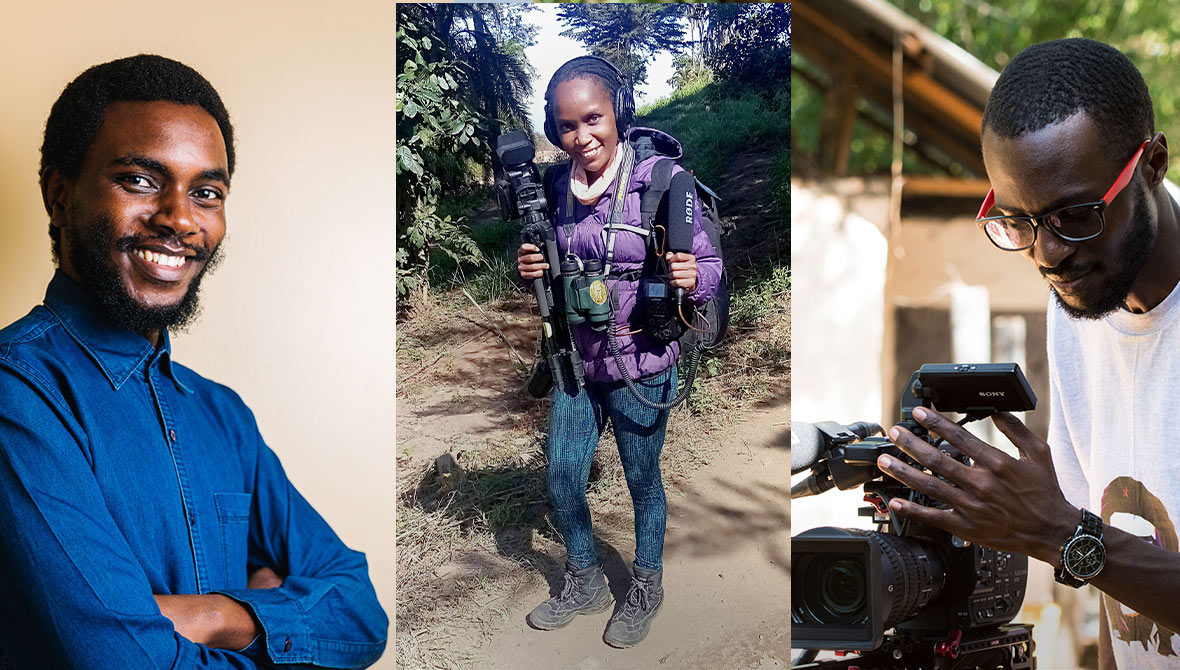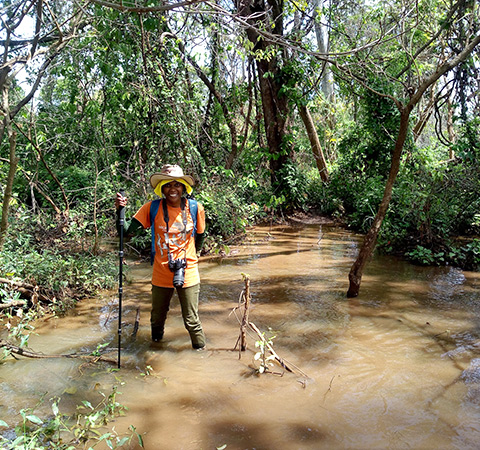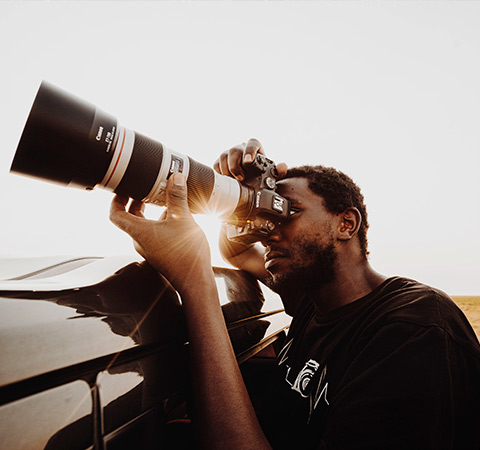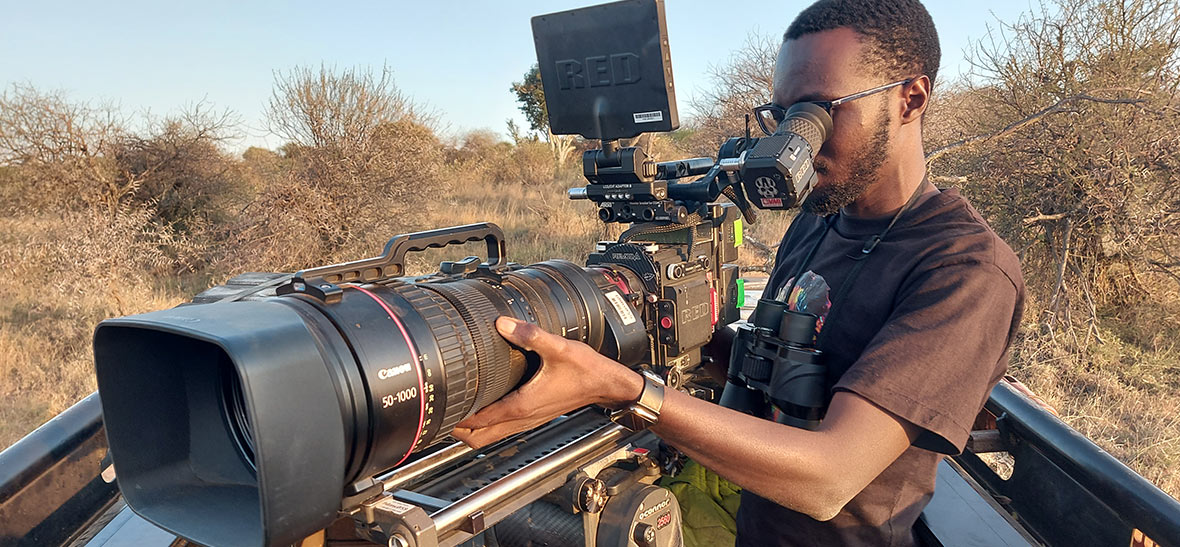Investing in our planet through African Conservation Voices

African Conservation Voices Media Labs fellows Peter Ndung'u, Martha Mutiso, and Maurice Oniang'o
Today, the world marks World Earth Day, a day that serves as a reminder to us all to protect the environment at all costs and work towards creating sustainable ecosystems in our different capacities. The best way to understand and embrace why we all need to invest in our planet is through the numerous stories that come from those that interact with nature on a daily basis. These stories often inspire us to do better and be a part of the solution, but we rarely acknowledge the change makers that document these great initiatives that also highlight on-the-ground challenges.
In 2021, AWF and Jackson Wild launched African Conservation Voices Media Labs to provide early to mid-career storytellers in Africa with the opportunity to learn from experienced wildlife film and conservation experts and help elevate voices on the continent as they share powerful conservation stories. Kenyan filmmakers have repeatedly demonstrated an interest to learn and grow in their field and the exceptional shortlisted participants have consistently proven to not only be up to the task but also ready to broaden their perspectives and skillset.
Through a series of media workshops, working side-by-side with experienced African and American filmmakers and conservation professionals, the program has offered participants the opportunity to hone their skills to develop, pitch, and create video content and creatively convey impactful stories. I had the privilege of speaking to three of the participants on their experiences so far reflecting on why the conservation space should invest more intentionally towards growing African talent in a bid to create homegrown practical solutions as the stories are shared to a broader audience.
Martha Mutiso - Freelance Tour Guide, Conservation Photographer and Filmmaker
Undoubtedly, Martha is passionate about nature, conservation and ecotourism. She has extensive experience working with numerous local communities that engage directly with both the tourism and conservation sectors.
Why did you apply for the African Conservation Voices Media Labs Program and what were your expectations coming in?
The program was very unique and came at a time when African voices needed to be elevated in the conservation storytelling field. I also wanted to learn how to package, pitch and share impactful conservation stories from the field through filming.
How best can you describe the African Conservation Voices Media Labs Program approach and its impact to you so far?
The program was practical, which made it easier to learn and understand storytelling in a short time. It has positively improved my storytelling skills, and it’s an opportunity that should be accessible to more young people - especially Africans.

African Conservation Voices Media Labs fellow Martha Mutiso on an expedition in Kitobo Forest
Any key lessons learned from the experience?
The experience reinforced my belief that stories positively ignite change and impact generations. I also learnt that stories have a powerful way to inspire people to take conservation action and that African voices do matter in terms of raising awareness of the plight of local species.
Did you experience any unexpected surprises while undertaking the program?
It’s been inspiring to learn from the program members and facilitators. The mentorship program has really been a highlight. I don’t think I would have had access to the mentors were it not for the program.
The theme for this year’s Earth Day is ‘Investing in our planet.’ From your perspective, share with us the importance of investing in nature-positive storytelling.
Stories are powerful and can get people invested in nature. They also have the power to connect people and nature and make us empathize with whatever is going on around us. By telling authentic conservation stories, we can use our voices to speak up for nature, wildlife, and communities co-existing with nature; and as these voices become louder, there will be minimal destruction of nature.
We have been seeing a positive mindset change and ownership of conservation narratives amongst young Africans over the past few years. How best do you see the youth playing a role in conservation beyond the ‘activism’ approach?
African youth are an important population in the conservation of biodiversity and have a huge impact on it. They are creative, innovative, technology-savvy, energetic, and oriented to problem-solving and have the potential to affect future environmental or conservation policies if given the opportunity.
What does an ideal future in conservation storytelling look like?
I look forward to a future where conservation storytelling is more inclusive; stories celebrating local communities involved in conservation and inspiring more to take action in the conservation of our wildlife, habitats, and promoting the preservation of indigenous knowledge, traditions and ancient cultures.
Peter Ndung'u – Award-Winning Visual Storyteller
Peter Ndung’u, one of the shortlisted participants, reiterates that his expectations continue to be met in unique and meaningful ways as he was introduced to a whole new world of storytelling. The amount of work that goes into creating and developing stories from start to finish is immense but extremely rewarding. The fact that he openly admits to have been at a point he was actively seeking out resources to elevate his work before coming across the program showcases his passion and dedication to create quality and relatable content that is not only good to look at, but creates a positive impact.
He goes ahead to share his thoughts on the African Conservation Voices programmatic approach and curriculum saying only one word could adequately describe it: quality.

African Conservation Voices Media Labs ellow Peter Ndung'u in the field
“Everything about the program was high-quality. From the guests, mentors, films we reviewed, material and knowledge shared with us. The biggest impact the program has had on me is that I now find myself being very intentional with the kind of projects I take on. For instance, for my travel photography and film work I’m actively seeking out narratives rather than the usual client brief that just needs ‘content’. I want to travel to places where there’s a story to tell. Kenya, and Africa in general, has a lot of stories yet to be told around people, nature, wildlife and conservation. Now, I look out for some of these things before I go anywhere.”
Ndung'u narrates how the program has completely changed how he looks at stories and storytelling analysing almost every film he watches trying to pick out different elements like who’s the main character/protagonist, what do they want, what stands in their way to get there, how do they overcome the challenges, how was the film shot, and so much more.
He emphasizes that the level of mentorship and dedication from the team caught him by surprise and that he lucked out to be in such a high-level program for free. This speaks to the need to continuously invest in nature-positive storytelling, which is in line with this year’s Earth Day theme, ‘Investing in our planet.’ Africans live and coexist within nature and there’s no one better to tell nature stories than the local communities who have grown up and been in and around nature throughout their lifetime.
Through this program, the participants have managed to learn more about our natural spaces and raise more awareness among fellow Africans and the world at large through telling and sharing authentic stories. In addition, equipping the youth with storytelling skills is a great place to start as they become more aware of how to tell conservation stories around them. Ndung'u stresses that there is definitely a huge potential for storytellers to collaborate in different capacities through science, research, writing, filmmaking, photography and creating visually impactful films that advocate for conservation without necessarily having to go the activism route. Getting them involved in this way creates an opportunity for multidisciplinary engagement in conversations revolving around conservation.
What he envisions for the future is awe-inspiring — a future where local communities are not just the subject of stories but are also heavily involved in the curation of their own stories. A space where they are the content creators empowering their fellow community members and inspiring upcoming generations. A future where Africa is setting the agenda and speaking in unison for nature, advocating for best ways to protect our continent.

African Conservation Voices Media Labs Fellow Maurice Oniang'o in the field
Maurice Oniang’o — Freelance Multimedia Journalist and Documentary Filmmaker
Passionate about nature storytelling, Maurice Oniang’o applied for the African Conservation Voices Media Labs program because he wanted to learn from experienced natural history filmmakers and also connect with a network of other like-minded filmmakers from Kenya and East Africa.
He applauds the open training approach of the program and the access to opportunities beyond. Oniang’o explains, “Experienced natural history filmmakers imparted great knowledge and tricks about the industry and were very open to us reaching out in the future for help or collaborations.” So far, the art of writing for film and television stands out as a key lesson.
“Sadly, because there is so much damage and destruction of nature, we tend to highlight that more and forget to showcase the positive things and the people who are doing the work that is positively impacting the planet,” says Oniang’o. While it is important to acknowledge the gravity of biodiversity loss, he believes that striking a balance delivers stronger stories. “An ideal future in conservation storytelling for me is having the communities involved driving the stories by collaborating with them,” he concludes.
There has been a global imbalance of film production with an overwhelming production of content from Western countries that traverses international borders and a limited influx of content from emerging film industries from the Global South. Consequently, when conservation stories are shared about occurrences in Africa, they are rarely captured by local filmmakers. It is imperative that programs such as these are made accessible to not only the urban youth but to include those from rural and peri-urban regions.
As the two organizations launched this pilot phase in Kenya, it was encouraging to see the interest of the United States Embassy in Kenya who has partnered with us to reframe the conversation about conservation by supporting the agency of African people in engaging global and local audiences in an appealing way that incites people to listen and drives action. The agency has been part of the journey and is underwriting an essential component of the Kenya media lab—a field session in the Olderkesi Conservancy in the Maasai Mara, which will bring together ten Kenyan participants alongside American and Kenyan mentors and trainers for a five-day field training to bring their film treatments to life as finished short videos.
> Learn more about the African Conservation Voices Media Labs